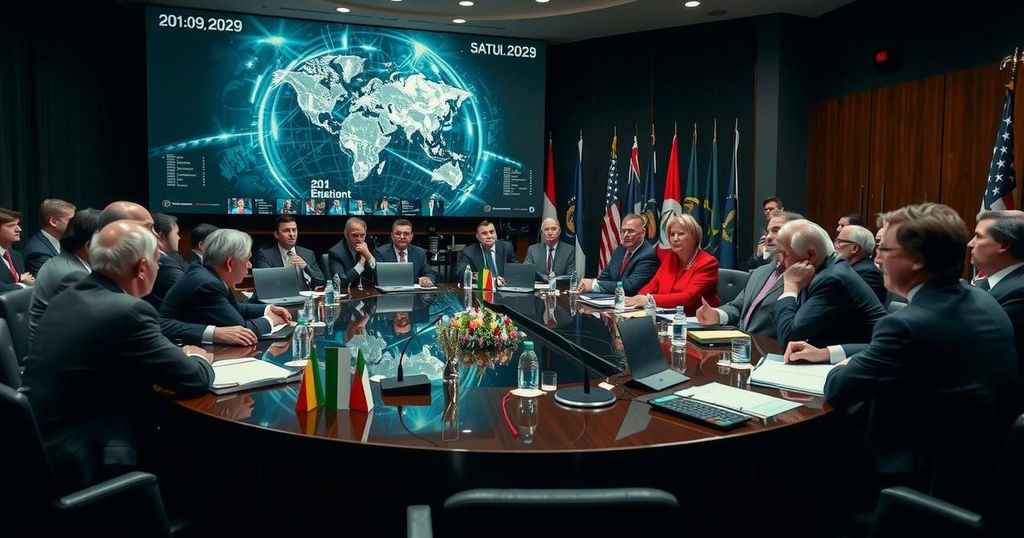Climate change
Global news
AFP, ASIA, AZERBAIJAN, BAKU, CARBON PROJECT, CLIMATE CHANGE, DONALD TRUMP, ED, ENVIRONMENTAL POLICY, EUROPE, FRANCE, GIORGIA MELONI, GLOBAL WARMING, GREENHOUSE GAS EMISSIONS, INTERNATIONAL RELATIONS, NORTH AMERICA, PARIS, PARIS AGREEMENT, RAMA, UNITED STATES, YALCHIN RAFIYEV
Jamal Walker
0 Comments
Divided Leaders at COP29 Face Urgent Call for Climate Action
During the COP29 climate talks in Baku, leaders presented conflicting approaches to address climate change, as a new report from the Global Carbon Project indicated a need to achieve net-zero carbon emissions by the late 2030s. The conference underscored the importance of financial commitments to support developing nations while highlighting tensions over fossil fuel reliance and decarbonization efforts. With urgency mounting due to rising emissions, leaders stressed the need for immediate and effective action.
At COP29 in Baku, numerous world leaders presented divergent strategies to combat climate change, amidst alarming findings that the increase in carbon dioxide emissions from fossil fuels has reached unprecedented levels this year. A recent report from the Global Carbon Project indicates that achieving the Paris Agreement’s target of limiting global warming to 1.5ºC necessitates achieving net-zero carbon emissions by the late 2030s rather than the previously set goal of 2050. Azerbaijan’s lead negotiator, Yalchin Rafiyev, emphasized the urgency of these targets, stating that the time to act is rapidly diminishing. Some leaders from nations facing severe climate impacts urged immediate action, as others defended fossil fuel use. Albanian Prime Minister Edi Rama expressed frustration over empty rhetoric surrounding climate change commitment, criticizing those leaders who chose to skip the conference. In stark contrast, others like Italian Prime Minister Giorgia Meloni advocated for a balanced approach, warning against extreme decarbonisation measures that may threaten economic stability. Meanwhile, discussions regarding financial commitments from wealthier nations to support developing countries reflect tensions over fulfilling climate finance pledges, highlighting the ongoing disparity in contributions and the necessity for prioritizing vulnerable populations in climate negotiations. The dialogues at COP29 encapsulate both the urgency of the situation and the intricate balance needed in tackling climate change, which is at a critical juncture with leadership complexities on a global scale.
The COP29 conference, part of a series of UN-led climate talks, is designed to forge agreements on global climate action. As countries grapple with the increasing severity and frequency of climate-related disasters, they must also navigate the complexities of financing these initiatives. A central issue at COP29 includes discussions about how wealthy nations can effectively support poorer nations in their climate adaptations and transitions while addressing the pressing need for demonstrable reductions in emissions. The findings from the Global Carbon Project report heighten the urgency of these discussions by underscoring that current emissions trajectories deviate significantly from the goals established in the Paris Agreement, particularly as industrialized nations face their own domestic challenges in advancing climate policies.
The proceedings at COP29 reveal a critical moment in climate negotiations, marked by scientific urgency and national divergences on solutions. As carbon emissions hit unprecedented levels and the timeline for effective action narrows, the necessity for equitable financial commitments from affluent nations to vulnerable states is more paramount than ever. Moreover, contrasting views among leaders reflect broader debates about the sustainability of fossil fuel usage and the balance between economic and environmental priorities. Ultimately, COP29’s outcomes will play a significant role in shaping the direction of international climate efforts moving forward.
Original Source: jordantimes.com




Post Comment